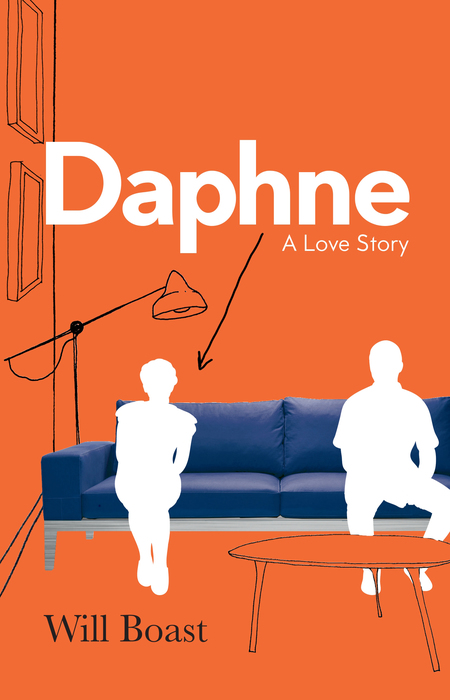Keeping people at bay is something that Daphne has become frighteningly good at over the years.
But before you leap to conclusions about a scarred and lonely childhood (though that plays a part as a result of the initial and ongoing source of trauma) or an abusive relationship that left her broken, the eponymous protagonist of Will Boast’s 2018 novel actually suffers from a rare and astonishingly real condition that means she becomes paralysed to some degree and for temporary amounts of time when she experiences intense emotion.
Having had to grapple with her condition since a traumatising teenage visit to the movies with friends which did not end up the way she’d planned, San Francisco-based Daphne has corralled her life to the point where it proceeds in a calm and orderly manner, all possible source of emotional unpredictability siphoned off so she’s as safe as she can be.
It may not sound like the most exciting of lives but Daphne to a large extent has made her peace with that, more out of necessity than outright acceptance, and resigned herself to a solo existence lived either with a set routine at work, or within the relative safety of her home.
She is, like everyone at the group she attends for those living with the condition, constrained by what she can’t do, which does bother her from time to time, but she has long rationalised that this is the way things are and there’s little to nothing she can do to change that.
“Now, lying in bed, I didn’t know whether to worry or treasure an inner secret. The girl detectives who always acted on a hunch, the dragon-riders in humming vibration with the very skies, Hardy’s tempestuous, willful, yearning women–maybe I was like them, more sensitive, more attuned than the rest of the plodding world. Call it hormones. call it fear, an overheated imagination, a longing to be somewhere, anywhere else. Call it simple teenage delusion. Still, I felt, then, so weirdly, fiercely alive.
Yet somehow, for ten then twenty seconds, as both Elizabeth-jane and I trembled on the verge of either ecstasy or disaster, I just couldn’t pick up the book.
I couldn’t move at all.” (P. 4)
Then one fateful night at a bar when she’s out with her childhood friend Brook, a high-flying events planner with a high-spirited, messily organised life that somehow hangs together, she meets the lovely Ollie, a quietly-spoken, sweet guy who, like many people before him, isn’t fazed by her condition.
That’s not to say he doesn’t find it confronting and bewildering at times but he isn’t honest enough to admit to that and he and Daphne are able to talk things through.
Still, the great dilemma remains for her – does she allow him into her world and pursue intimacy that might just paralyse her as she begins to feel more and more strongly for Ollie or just she pull up the drawbridge and send Ollie to where so many have gone before – emotional oblivion.
Usually it’s an easy decision for Daphne, one she’s made many times before.
But Ollie is different – he is kind, understanding and while not perfect, he gets her in a way few others have before, and so she begins to let him into her walled-off world, exposing herself to the kind of emotions she has long avoided.
Daphne is far more, as you might have gathered, than just the story of isolated person falling in love.
It encompasses musings on the way modern day life has provided some unheard freedoms and access for people like Daphne, while acknowledging that the very nature of her condition means that being sealed off from the normal rhythm of day-to-day life is something that might never change for her.
With that in mind, and understanding her natural reticence to let anyone in, not simply because of the effect they have on her physically but because their rejection of her, whether immediately or eventually, Boast insightfully and empathetically takes us deep into Daphne’s heart and mind, places where so much is longed for and yet so little is allowed to be.
This is the great horns of dilemma on which Daphne rests, her choices seemingly straightforward – love Ollie or don’t, let him in or don’t – and yet muddied and complicated by the fact that self determination for her is far from simple, with a thousand different variables impinging on what she decides to do.
The brilliant nuance of Boast’s writing means that we come to know Daphne very well, and far from being a pathetic figure who feels sorry for herself, we watch as Daphne tries hard to fashion some sort of meaningful life for herself while acknowledging there are some things, ballsy, outspoken attitude notwithstanding, that she simply won’t be able to do.
But where does Ollie sit in this seemingly simple but in reality, often muddled and messy, decision making process?
“I watched Sherman drag himself up his front steps. Until next Sunday’s meeting, he could work from home. He could order in groceries and cat food, get his laundry picked up, dropped off. Obscure movies, craft beer, high-end toiletries, organically grown weed, gift-wrapped llama shit–anything he could dream of ever needing he could call up online and never have to go out. I watched him check his mail and disappear inside. Back home safe.
Trapped but safe.” (P. 152)
That is the million dollar question, and as Daphne goes on, our vulnerable and likeable protagonist’s life taking two steps forward and eight steps back, assuming steps are taken at all which is always an option if not a good one, we are party through words rich and affecting, and at times, winningly funny, to a very human tale of one person coming to terms with the fact that their life might not be so limited after all.
Or it very well could be, with Daphne never one hundred percent certain she is going to see her wishes come true, even when she decides they are worth wishing for.
Daphne is one of those rare and lovely books where you fall hard for the protagonist because they are so damn real.
A scientist with a successful career and her own home, Daphne grapples in very real form with something we all struggle with in one form or another which is letting people in where they might be the best thing that could happen to us or they could do untold damage; in her case, however, what are largely emotional and psychological struggles take physical form with her, transforming how she decides what she can and can’t do in ways we would normally be only able to guess at.
Thanks to Boast, however, and the sublimely heartfelt and honest delights of Daphne, we are given privileged insight into the fragile world of someone who wants to carpe the diem out of her life but keeps coming back to what she can’t do even as she begins to consider what might happen if she goes forward and commits to what might be, problems and all, and life finally gets a chance to show what it is made of.

